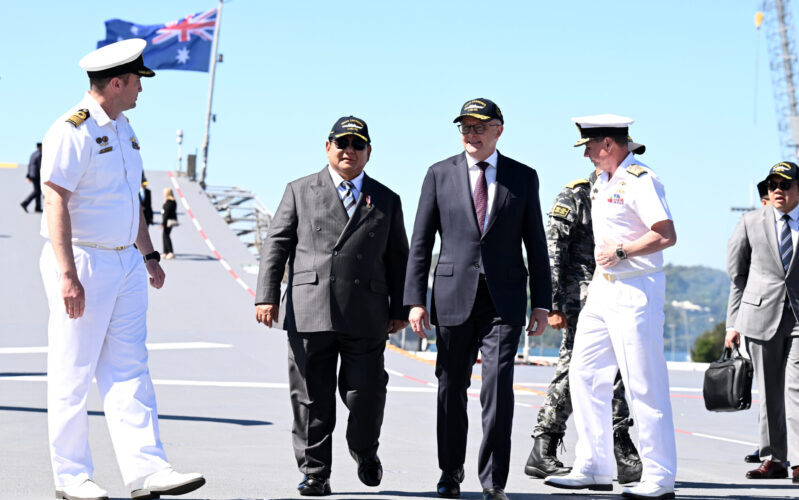
Australian Prime Minister Anthony Albanese and President of the Republic of Indonesia, Prabowo Subianto after announcing a security agreement aboard HMAS Canberra at Fleet Base East, in Sydney, Wednesday, November 12, 2025. (AAP Image/Dan Himbrechts) NO ARCHIVING
Australia has entered into a new security treaty with Indonesia, a move met with significant domestic unrest in Indonesia. Protests have erupted throughout the country in response to President Prabowo Subianto‘s policies, including a controversial free school meals program and a proposed law that would expand the military’s political role. While Australians have largely overlooked the escalating tensions in Indonesia, this treaty raises questions about the commitment to human rights and democratic governance in the region.
Indonesia has experienced a surge in protests in 2024, with demonstrators expressing frustration over the government’s budget cuts and the perceived corruption of political leaders. Many Indonesians are particularly discontented with the $3,000 housing allowance granted to politicians, which has become a symbolic representation of inequity in a struggling economy. As the unrest grows, President Prabowo’s attempts to elevate former dictator Soeharto to national hero status have only intensified public outrage.
During a recent visit, Prime Minister Anthony Albanese and President Prabowo toured the Royal Australian Navy’s flagship, the HMAS Canberra, where they signed the new treaty. This event, which some have characterized as a staged photo opportunity, was intended to showcase the military partnership between the two nations. Critics argue that the choice of venue was a deliberate attempt to avoid media scrutiny regarding Prabowo’s controversial past and ongoing governance issues.
Details of the Treaty and Historical Context
The latest treaty has been framed as an “upgraded security treaty,” although its practical implications remain unclear. According to Foreign Minister Penny Wong, the agreement is designed to facilitate consultations on security matters and to enhance cooperation between the two countries. However, the language used in the treaty raises concerns about its efficacy. Wong noted that the treaty includes provisions for both nations to “consult and consider” responses to security threats, a phrase that appears vague and non-committal.
Historically, the last significant security treaty between Australia and Indonesia was signed in 1995 during the tenure of Prime Minister Paul Keating and Soeharto. That agreement was effectively nullified when Indonesian troops invaded East Timor in 1998, highlighting a precedent of the two nations’ security partnerships being tested in times of crisis. With ongoing tensions in regions such as West Papua, concerns remain about how this new treaty might be tested in the future.
Indonesia’s foreign policy asserts its position as a non-aligned nation, a stance that dates back to its independence from colonial rule in the 1940s. Former Foreign Minister Retno Marsudi articulated this policy as one that seeks to avoid alignment with superpowers, emphasizing a commitment to independence and active engagement in international relations. The recent treaty’s implications for this stance are still under scrutiny.
Public Sentiment and Future Implications
Public sentiment towards the treaty is mixed, with many Indonesians expressing distrust towards both their government and Australia. Polls conducted by the Lowy Institute indicate a persistent wariness in Australian attitudes towards Indonesia, with many viewing their neighbor with suspicion. This historical distrust complicates efforts to foster deeper ties between the two nations.
As Australia and Indonesia navigate this new chapter in their relationship, the effectiveness of the treaty will depend on the willingness of both governments to address the underlying issues facing Indonesia, particularly regarding human rights and democratic governance. Critics argue that security agreements should not come at the expense of accountability and transparency.
In summary, the recent treaty between Australia and Indonesia highlights the complexities of international relations in a region marked by significant internal strife. As both nations move forward, it will be essential to monitor how this agreement impacts not only regional security but also the broader landscape of human rights and democratic values in Indonesia. The treaty may symbolize cooperation, but it also raises critical questions about the nature of that partnership in light of ongoing unrest.





